-
Fauna and Flora, Earth and SkyBrushes with Nature's WisdomFrom"Cows, Arrogance, the Natures of Things"
In the shed the cow lies upside down mooing weakly. The men hang droplights from the ridgepole, and keeping her on her back, they spread her front and hind legs in opposite directions, tying them to opposite walls so she can’t kick. Kneeling over her swollen belly holding something that looks like a miniature fire extinguisher, the vet sprays her with antiseptic. The cow’s eyes roll, the whites showing, and she lets out faint moans, ever dwindling protests of pain and fear.
Used courtesy of the University of Iowa Press
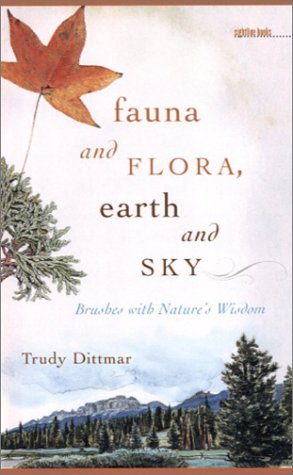 Fauna and Flora, Earth and Sky : Brushes with Nature's Wisdom
Fauna and Flora, Earth and Sky : Brushes with Nature's Wisdom -
Fauna and Flora, Earth and SkyBrushes with Nature's WisdomFrom"Cache"
I found the deer not long before I got his first call, the first Sunday in October. Before that it had been just letters, since I’d met him back in June. It was mid-week preceding his call, Wednesday or Thursday. I’d been hiking back along the Wildcat Creek, and just as it was coming on twilight I found the body, cached. It was all but covered with a heap of spruce cone scales, but I saw a tawny bit of it, and I bent down and touched it and it was a fresh-cached deer.
Used courtesy of the University of Iowa Press
 Fauna and Flora, Earth and Sky : Brushes with Nature's Wisdom
Fauna and Flora, Earth and Sky : Brushes with Nature's Wisdom -
Fauna and Flora, Earth and SkyBrushes with Nature's WisdomFrom"Cache"
The porcupine lay there on her back, as if looking up at us. One foreleg lay across her breast and the other was curled by the side of her face. It did seem, in fact, that she wore a parka of guard hairs, yellow around her body. A shining hood of them circling her face. Her hind feet curled toward the earth, the golden hairs curving over them like little fur boots.
Used courtesy of the University of Iowa Press
 Fauna and Flora, Earth and Sky : Brushes with Nature's Wisdom
Fauna and Flora, Earth and Sky : Brushes with Nature's Wisdom
-
Hope Is the Thing with FeathersA Personal Chronicle of Vanished BirdsFrom"The Dark Beneath Their Wings"
In a volume of his American Ornithology, pioneering naturalist Alexander Wilson described a flock of Passenger Pigeons that he had witnessed in the early 1800s as the birds flew between Kentucky and Indiana. The flock, Wilson estimated, numbered 2,230,272,000 birds. “An almost inconceivable multitude,” he wrote, “and yet probably far below the actual amount.” The multitude spanned a mile wide and extended for some 240 miles, consisting of no fewer than three pigeons per cubic yard of sky… if Wilson’s flock had flown beak to tail in a single file the birds would have stretched around the earth’s equatorial circumference 22.6 times… With their powerful chests and long, quick-snapping wings, the pigeons flew an average of 60 miles per hour for hours at a time. Sometimes the swift and seemingly endless flocks stretched across the entire dome of sky, so that wherever one looked, horizon or zenith or somewhere between, there flew the pigeons. They closed over the sky like an eyelid.
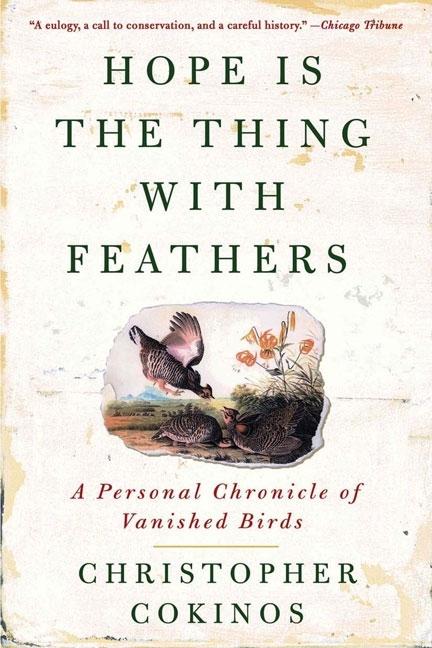 Hope Is the Thing with Feathers : A Personal Chronicle of Vanished Birds
Hope Is the Thing with Feathers : A Personal Chronicle of Vanished Birds -
The Fallen SkyAn Intimate History of Shooting Stars
On any clear night, under a dark enough sky, we can see shooting stars. We wish upon them, even if we don’t quite know what they are—of course they’re not really stars—and even if we don’t know where they come from or what they might tell us about the universe. It’s as if we’re eager to pin our chances on something strange and sudden, something beautiful beyond our ken. Across cultures and time, we have written ourselves into the sky. We create constellations, transforming the random spatter of stars into shapes and stories. We name planets after gods. And we associate meteors and meteorites—the light of dust or rocks burning passage through the air, and the stones, after such fire, that sometimes fall to Earth—with the most elemental aspects of our lives: good luck, ill fortune, and even death.
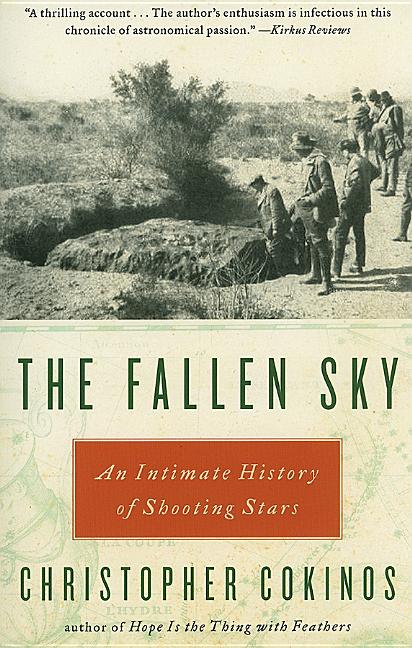 The Fallen Sky : An Intimate History of Shooting Stars
The Fallen Sky : An Intimate History of Shooting Stars -
Bodies, of the HoloceneEssaysFrom"Pollen"
And so I sing to you.
I sing how we are pollen walking.
I sing April, I sing summer and late September, I sing the sex of flowers and trees that lands on our cotton shirts and summer dresses, on our skin and hair, and how we breathe them in, the beautiful provocations: the lanky engineer, the new med student. I sing the lazuli bunting, thimbleberry and columbine. I sing the growing slickness of your skin. I sing marmot, mountain nine bark and lupine. Spheres and folds, spikes and creases, stem and root.
I sing how syllables are songs, stories, too, for the deep beginnings of the word pollen, and I love this, mean “dust” and “meal.”
What we become, what we need along the way.
 Bodies, of the Holocene : Essays
Bodies, of the Holocene : Essays
Selected Works
read more >-
Blood HorsesNotes of a Sportswriter’s Son
When the gates fly open the horses are like a freak storm moving over the track together, their legs attended by a cloud of dust that they trail behind them, their jockeys’ colors flashing kaleidoscopically in the sunlight. The loudness of their pounding takes me by surprise. It overwhelms even the crowd. I am so stunned by the sight of them that by the time I collect myself, they have disappeared around the turn. We who are sitting close to the wire stand there listening to the call, waiting for them to reappear.
 Blood Horses : Notes of a Sportswriter’s Son
Blood Horses : Notes of a Sportswriter’s Son -
Blood HorsesNotes of a Sportswriter’s Son
A little under a million years ago, the old Atlantic land bridge having receded and a new one having formed over the Bering Strait, this thing, which was now a specimen we would recognize, found its way over—opposite to the way we came—and colonized Europe and Asia: herds of wild horses, alpha stallions with their harems of mares, “bachelor bands” of subdominant males, moving like wind patterns across the steppes and the plains. They had become ungulates—mono-toed, hooved—and they had become fast, faster than anything on the solid earth apart from the cats, and the cats could maintain their speed for only a few hundred yards or so, whereas this creature could run from morning to night.
 Blood Horses : Notes of a Sportswriter’s Son
Blood Horses : Notes of a Sportswriter’s Son -
Blood HorsesNotes of a Sportswriter’s Son
So many horses had died in World War I that some voiced fears for the global equine population: numbers had dipped low enough that a single epidemic might put the species within range of extinction. Field Marshal Haig, not convinced by the tends of thousands of men he had watched ride to their deaths, was still arguing in 1926 for the “value” of the horse in war, writing that “as time goes on, you will find just as much use for the horse—the well-bred horse—as you ever have done in the past,” but by the time World War II broke out, even the old fops had accepted the fact that tanks, planes, and machine guns made cavalry tactics untenable.
 Blood Horses : Notes of a Sportswriter’s Son
Blood Horses : Notes of a Sportswriter’s Son
Selected Works
read more >-
A Thousand Years of Good PrayersStoriesFrom"Extra"
Several times a day Granny Lin bathes Old Tang: in the morning and before bedtime, and whenever he wets or dirties himself. The private bathroom is what Granny Lin likes best about her marriage. For all her life, she has used public bathrooms, fighting with other slippery bodies for the lukewarm water drizzling from the rusty showers. Now that she has a bathroom all to herself, she never misses any chance to use it.
 A Thousand Years of Good Prayers : Stories
A Thousand Years of Good Prayers : Stories -
A Thousand Years of Good PrayersStoriesFrom"Immorality"
Our bodies freeze. We look at the boy’s face. Even with his swollen face and black eyes, we have no problem telling that he has the face of the dictator, young and rebellious, just as in the illustrations in the books about the dictator’s heroic childhood. The boy stands up and limps to his mother. We look at his face in awe, not daring to move when he spits bloody phlegm at our feet.
“Remember this face,” the boy says. “You will have to pay for this one day.”
 A Thousand Years of Good Prayers : Stories
A Thousand Years of Good Prayers : Stories -
A Thousand Years of Good PrayersStoriesFrom"A Thousand Years of Good Prayers"
A rocket scientist, Mr. Shi tells people when they ask about his profession in China. Retired, he then adds, out of modesty, when people marvel. Mr. Shi learned the phrase from a woman during a layover at Detroit, when he tried to explain to her his work, drawing pictures when his English failed to help. ‘A rocket scientist!” the woman exclaimed, laughing out loud.
 A Thousand Years of Good Prayers : Stories
A Thousand Years of Good Prayers : Stories
Selected Works
read more >-
The Dead Fish MuseumStoriesFrom"The High Divide"
…one morning at the very end I heard him calling me in the rain. He was on top of our house in boxer shorts, yelling. Our neighbor tried to drive him off the roof by throwing a pot of geraniums at him. My dad started ripping apart the chimney and pitching bricks down on me and everybody else on the front lawn. We had to call the authorities. For a while he thought he was Jesus in a hospital called St. Judas, but it was really St. Jude’s and my dad, of course, wasn’t Jesus.
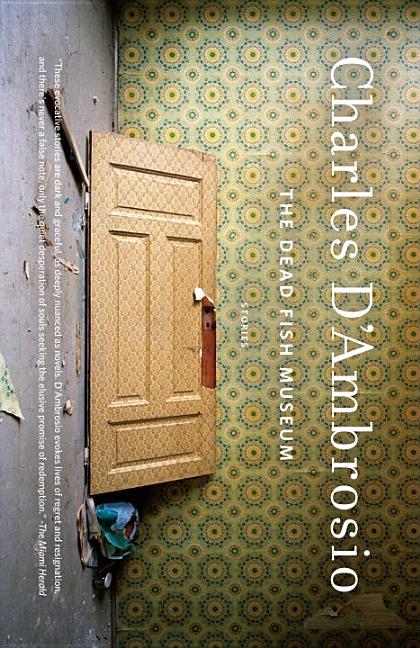 The Dead Fish Museum : Stories
The Dead Fish Museum : Stories -
The Dead Fish MuseumStoriesFrom"Screenwriter"
The moth flew from my hand, a gust fanned the flames, there was a flash, and the girl ignited, lighting up like a paper lantern. She was cloaked in fire. The heat moved in waves across my face, and I had to squint against the brightness. The ballerina spread her arms and levitated, sur les pointes, leaving the patio as her legs, ass, and back emerged phoenix-like out of the paper chrysalis, rising up until finally the gown sloughed from her shoulders and sailed away, a tattered black ghost ascending in a column of smoke and ash, and she lowered back down, naked and white, standing there, pretty much unfazed, in first position.
 The Dead Fish Museum : Stories
The Dead Fish Museum : Stories -
The Dead Fish MuseumStoriesFrom"The Dead Fish Museum"
They walked into the building and rode the freight elevator upstairs. “First thing you do,” Greenfield said, “is board up all the windows. This is a nonunion job.”
“A union for porn?” Ramage said.
“Erotica,” Greenfield corrected him. “There’s a street tax we’re not paying.”
“What’s the plot of this one?” Ramage asked.
Greenfield lowered his glasses and looked at him over the rims as if he were stupid.
“Boy meets girl,” he said.
 The Dead Fish Museum : Stories
The Dead Fish Museum : Stories
Selected Works
read more >-
The Abstract WildEssaysFrom"The Abstract Wild: A Rant"
If anything is endangered in America it is our experience of wild nature—gross contact. There is knowledge only the wild can give us, knowledge specific to the experience of it. These are its gifts to us. In this, wilderness is no different from music, painting, poetry, or love: you concede the abundance and try to respond with grace.
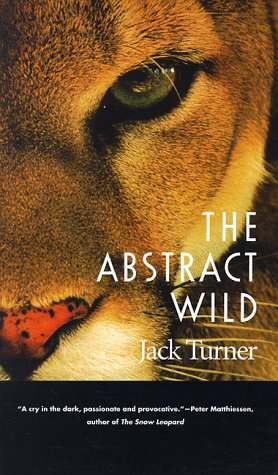 The Abstract Wild : Essays
The Abstract Wild : Essays -
The Abstract WildEssaysFrom"Mountain Lions"
Not until I was driving home did I realize I’d felt no desire to shoot the lion, an unusual reaction since I shot almost everything then, believing firmly that the world was here for my amusement and that killing was fun. But the lion was different. I have heard wolves howl and seen grizzlies wander high meadows and a tiger feed on a young water buffalo, but no wild animal has captured my imagination like that first lion. I might say she was a totem, but I believe it is simpler than that: I was smitten.
 The Abstract Wild : Essays
The Abstract Wild : Essays -
The Abstract WildEssaysFrom"In Wildness is the Preservation of the World"
On my travels in Tibet I was always delighted by the tradition of sky-burial. The human body is cut up and the bones broken to the marrow and left for animals, mostly birds. Later the bones are pounded and mixed with tsampa—a roasted barley—and again offered to the animals. Finally everything is gone, gone back into the cycle. Recently, when a friend lost her beloved dog, she carried it out to a beautiful view of the mountains, covered it with wild flowers, and left it for the coyotes and ravens and bugs. We should have the courage to do the same for ourselves, to re-enter the great cycle of feeding.
 The Abstract Wild : Essays
The Abstract Wild : Essays
Selected Works
read more >-
7 TattoosA Memoir in the Flesh
I show Hanky Panky the design that I adapted from a photo in a book of Dayak art, and he has me take off my shirt and he sketches the design on my collarbone with a grease pencil. Then he calls over an assistant to shave my chest. Now, under other circumstances, this could be kind of a turn-on. But in Hanky Panky’s tattoo parlor it justs reminds me of the shaving I had to undergo before some surgery I once had in the groin region. That one, much to my initial disappointment, had been performed by a male nurse, although actually I did see the wisdom of having a man for the job at around the time he began to whisk the razor around my balls. “Hey, be careful. Please!” I begged. And my male nurse answered, “Don’t worry, buddy. I’ll handle ‘em like they were my own.”
 7 Tattoos : A Memoir in the Flesh
7 Tattoos : A Memoir in the Flesh -
7 TattoosA Memoir in the Flesh
But inside the warehouse there are rows of pews. And every pew is filled with junkies. There are black junkies and Anglo junkies and Latino junkies. There are twelve-year-old boys sniffling from their first training-wheel habits and stooped veterans with hands like waterlogged sponges, those hands that everyone calls “New York mittens.” There are fashion models with the faces of drowsy angels who’ve been chauffeured down from townhouses in the East Sixties and who’ll powder their tracks with Lancome before the next day’s photo shoot. There are cadaverous, crookbacked junkies who’ve crawled from beneath rain-soaked packing crates in Tompkins Square Park and whose bodies are gruesome exempla of their disease: every vein collapsed, every limb cratered, eyes jaundiced, teeth rotten, dicks gone flaccid as the peeled shrimp in a fishmonger’s window—the kind of junkies you always look at and think, At least I’m not that bad.
 7 Tattoos : A Memoir in the Flesh
7 Tattoos : A Memoir in the Flesh -
7 TattoosA Memoir in the Flesh
Here are the benefits of being alone and celibate:
You can read all night and no one will nag you to turn off the light.
You can go to Borneo on the spur of the moment without anyone wanting to know when you’ll be back.
You can prepare meals so disgusting you’d be ashamed to eat them in company: Grill a slice of bologna till it curls up at the edges; fill the cup with baked beans; then top with a slice of Kraft American cheese and broil till melted. Serve with dill pickle and sliced tomato.
You can fart to your heart’s content without having to say “Excuse me,” though you may grow so accustomed to this that you find yourself doing it in public places—on the line at your savings bank, for instance – and getting nasty looks from strangers.
… On bad nights you can scoop up your cats and cuddle them shamelessly, even kissing them on the nose, though they usually dislike this and will try to shove you away with their paws. If worse comes to worst, you can press your face against their bodies and weep copiously into their fur.
 7 Tattoos : A Memoir in the Flesh
7 Tattoos : A Memoir in the Flesh
Selected Works
read more >-
Playing in TimeEssays, Profiles, and Other True StoriesFrom"The Prospect"
Like most of the fight world’s habits, hand wrapping is both practical and ritual. Done properly, it protects the hands from damage without giving a fighter an unfair advantage. Like boxing gloves or a football helmet, wrapping functions as both armor and sword, a protective measure that allows you to hit harder and more frequently than you could without it. One of the officials murmured, “That’s beautiful.” Colonna said “Thank you” without looking up from his work.
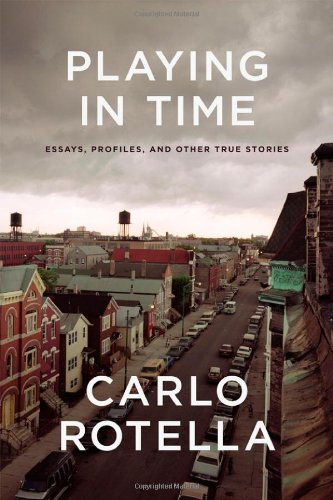 Playing in Time : Essays, Profiles, and Other True Stories
Playing in Time : Essays, Profiles, and Other True Stories -
Playing in TimeEssays, Profiles, and Other True StoriesFrom"Someone Else’s Chicago"
The Polkaholics, sweating like stevedores, are in fine ironic form, decked out in white shoes, black pants, white ruffled shirts, and stunning leopard-print vests with matching oversize bow ties. All wear thick-framed glasses, and anyone standing anywhere near the stage can smell the torrent of Old Spice with which they douse themselves, Method actor style, before a show. They do not play polka versions of rock tunes, an ill-advised crossover strategy that has produced far too many bizarre novelty songs by polka bands. Rather, they play original songs and well-chosen polka covers that make use of rock sensibilities, winkingly sampled classic-rock phrases, and bursts of the jet-engine guitar whine common to certain forms of punk and heavy metal—all undergirded by drums and bass playing straight-ahead, hurry-up polka rhythms.
 Playing in Time : Essays, Profiles, and Other True Stories
Playing in Time : Essays, Profiles, and Other True Stories -
Playing in TimeEssays, Profiles, and Other True StoriesFrom"Un Clown Biologique"
Tom C. cultivated a morbid fascination with clowns. Instead of merely doodling in class, he created obsessive dossiers of clown types: the savage Jester, the crocodile-teared Sad Clown, the enigmatic Bowler Hat, the rare Plume Clown, the annihilating Whiteface. He practiced different stylized ways of saying the word clown—drawing it out, barking it sharply, stretching his rubbery features to make a demented face while he said it, adopting a strangled or a booming voice—as if he could figure out what was hiding in the word by turning it inside out. He drew up clown scenarios and composed clown ditties, and invented ancient traditions to which they belonged. He tried to figure out if it would be worse to wake up one night to find a clown at the foot of your bed or to think you had dreamed it and then find a deflated balloon in your room the next morning.
 Playing in Time : Essays, Profiles, and Other True Stories
Playing in Time : Essays, Profiles, and Other True Stories
Selected Works
read more >-
Harper's MagazineJanuary 2005From"Romance of Rust: Nostalgia, Progress, and the Meaning of Tools"
I've lurked in chat rooms with discussion threads devoted to such subjects as “A previously unknown Albert Goodell brace found in the wild.” One sweltering summer morning, on the Jay County fairgrounds in the farming village of Portland, Indiana, I walked among fabulous machines as small as schnauzers and as huge as elephants, all gleaming in the August sun. Drive belts whirred, flywheels revolved, pistons fired, and a forest of smokestacks piped foul smoke and rude music into the otherwise cloudless sky. Mostly, I have ridden a Midwestern circuit of flea markets and farm auctions in the passenger seat of an emerald green Toyota pickup truck piloted by a fifty-five-year-old botanist with a ponytail, spectacles like windowpanes, and a beard verging on the Whitmanesque.
 Harper's Magazine : January 2005
Harper's Magazine : January 2005- Print Books
- Harper's Magazine
- E-Books
- Google Books
-
Harper's MagazineApril 2008From"Falling: Confessions of a Lapsed Forest Christian"
In the depths of the Great Depression, the peak had become home to the largest cross on Earth, a 103-foot-tall monstrosity of concrete and steel. Some 50,000 San Franciscans had gathered for the dedication ceremony, held March 24, 1934, at the summit. Far away in Washington, D.C., at precisely 7:30 P.M. Pacific Standard Time, President Roosevelt depressed the golden key of his executive telegraph, an electric signal leapt the continent, and atop Mount Davidson the cross, lit from below by twelve 1,000-watt lamps, blazed into the night sky like a flaming sword. It would continue to glow, a lunar presence on the San Francisco skyline, off and on for the next forty-two years, until 1976, when—except for a few days at Christmas and Easter—the national energy crisis extinguished it.
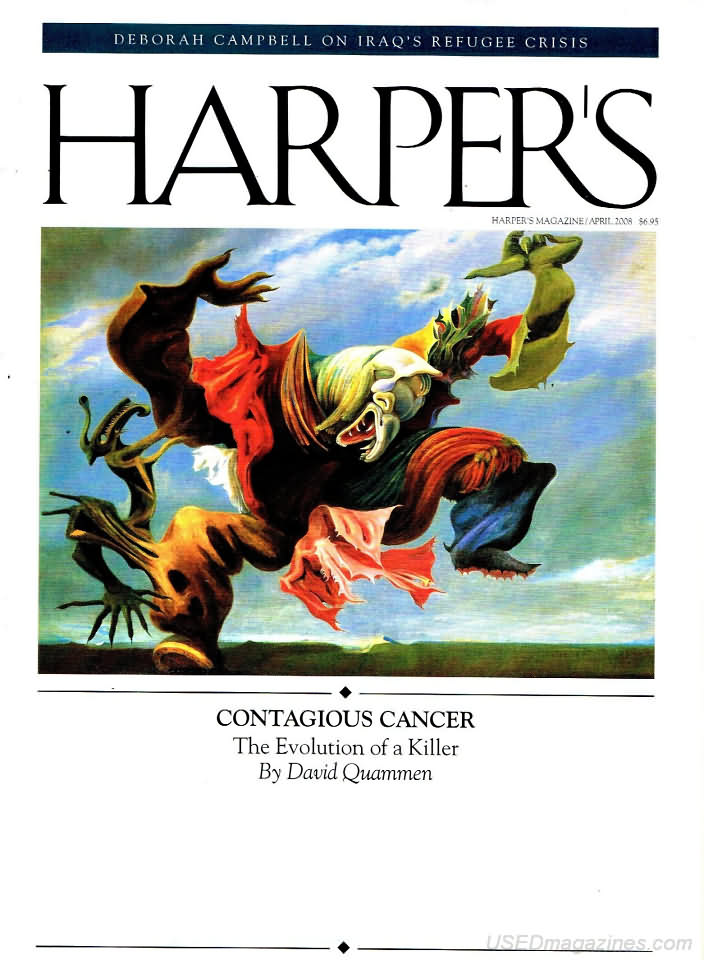 Harper's Magazine : April 2008
Harper's Magazine : April 2008- Print Books
- Harper's Magazine
- E-Books
- Google Books
Selected Works
read more >-
InsectopediaFrom"Death"
With careless hands a child kills an ant. Flies are far trickier, though once caught, they have little chance. And, if darting birds don’t grab them first, butterflies die natural deaths; few people—collectors excepted—willfully still such tremulous beauty.
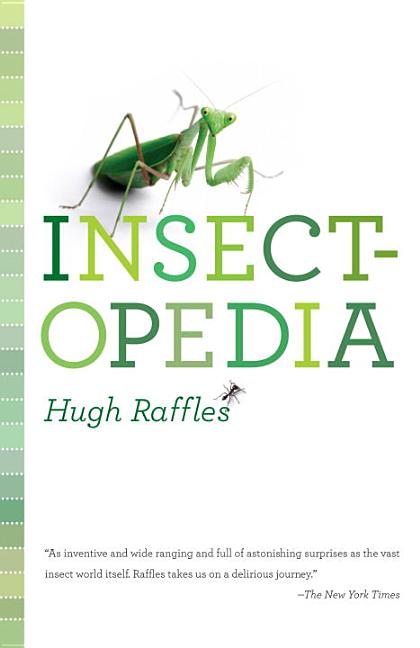 Insectopedia : Essays
Insectopedia : Essays -
InsectopediaFrom"Death"
Flies, St. Augustine wrote, were invented by God to punish man for his arrogance. Was that what the people of Hamburg were supposed to feel in 1943 as they stumbled through the smoldering ruins of their city during the pauses between Allied bombing raids? Flies—“huge and iridescent green, flies such as had never been seen before”—were so thick around the corpses in the air-raid shelters that, across the floors writhing with maggots, the work-teams detailed to collect the dead could reach the bodies only with flamethrowers.
 Insectopedia : Essays
Insectopedia : Essays -
InsectopediaFrom"Geneoristy (The Happy Times)"
And then, at the instant the referee directed the trainers to prepare their crickets, silence snapped into place, the room seemed to hold its breath. The two trainers began again to gently stroke their animals with the yard grass (back legs, abdomen, jaws). The crickets remained motionless. If you were close enough, you could see the beating of their hearts.
 Insectopedia : Essays
Insectopedia : Essays